All dogs who find themselves living on the streets dream of finding their parents and feeling their unconditional love.
Street life is extremely difficult for all homeless canines, and even more so for the little puppies.
Sadly, many puppies who have just come into the world end up separated from the loving arms of their mom. Their merciless owners abandon them and deprive them of love and happy puppyhood.
Rosie was one of the many fur babies who was left on the side of a road. Without her mom, the tiny fur baby felt lonely and scared. She kept expecting to reunite with her and feel her love once again.
In Need Of Help
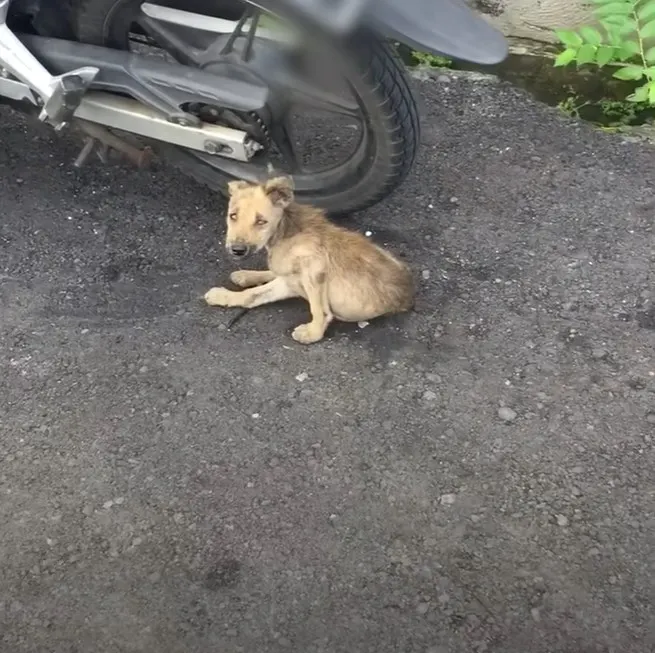
After some time had passed, the abandoned puppy realized that her mom wasn’t coming. The little pooch was hungry and she decided to ask humans for help.
Unfortunately, just as the puppy was crossing the street, she was hit by a motorbike. She was injured and unable to move.
A woman named Nele, who was a volunteer at a local shelter, found her.
Nele felt sad to see the tiny, frightened puppy all alone and in urgent need of help. The pup’s face was a little deformed. She was underweight and she was missing a lot of fur.
Nele held her face in her hands, and the fur baby looked at her. She realized that this puppy was a fighter.
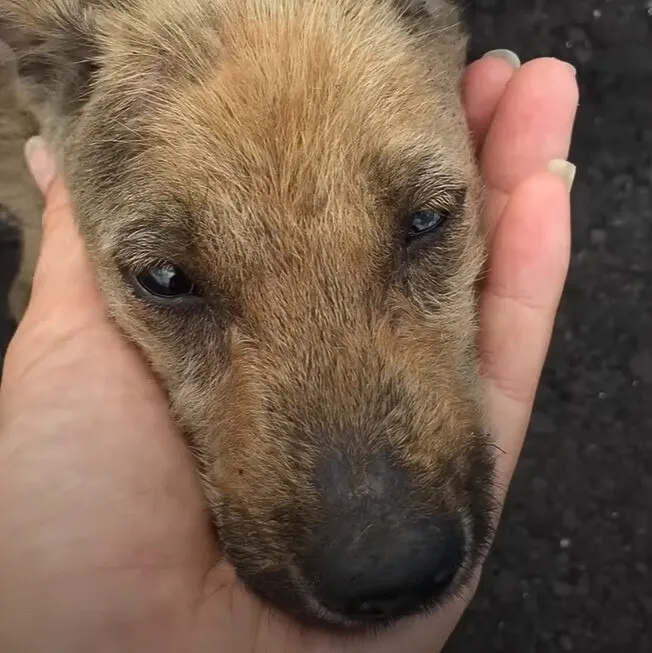
“The way she looked into my eyes, there was a strong will to live,” Nele told The Dodo.
She took the puppy, later named Rosie, to the vet clinic. The pup had multiple fractures on her hip. The vets took care of her and monitored her until she felt better.
Thriving in Her Foster Home
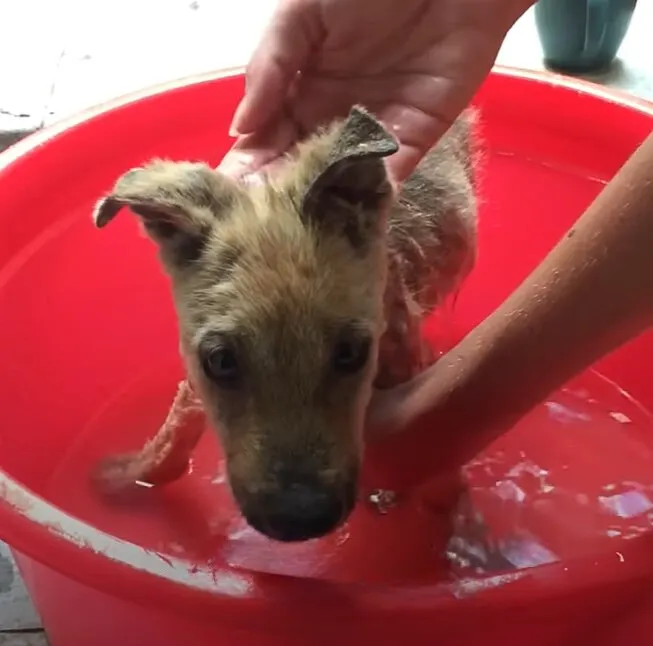
Nele decided to foster Rosie herself and took her home. She gave the pooch medicated baths and was determined to help her heal.
The puppy began eating and she gained weight. Nele cuddled the sweet baby and gave her all her love and support.
“I held her in my arms, showing her that I’m there for her,” Nele added.
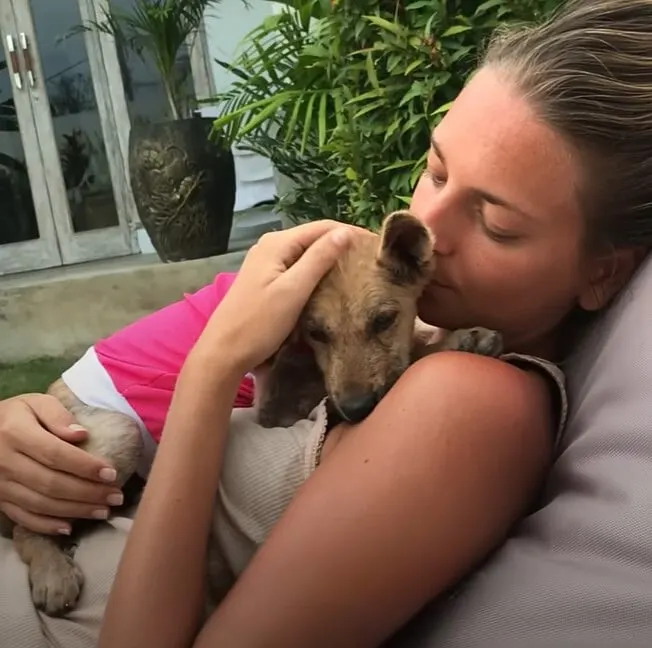
After feeling safe and loved, Rosie thrived.
Three weeks later, she started coming out of her shell and showing her wonderful personality. The lovely puppy became stronger. She didn’t want to stay in the house anymore.
Nele took her outside and carried her in a baby carrier because the pup couldn’t walk properly. Rosie was happy. She couldn’t stop smiling while she looked around and admired the view.
As time passed, the fur baby became more energetic. She started walking better.
Rosie’s foster mom was overjoyed when the resilient pup made a full recovery.
She took Rosie to the ocean for the first time and the pooch enjoyed running on the beach. She was playful and carefree.
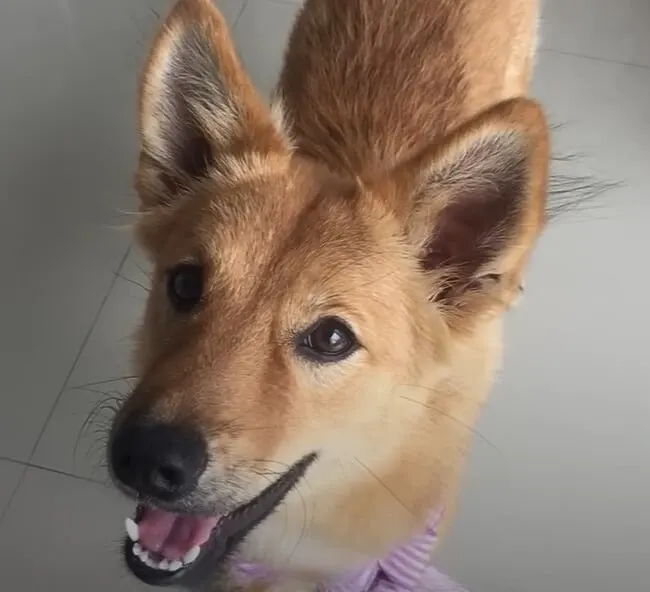
Eventually, her fur grew back, and she became a fluffy pup.
Nele rejoiced at seeing her transform into a beautiful and happy princess. She knew that Rosie was ready to go to her forever home.
The Beautiful Fur Baby Finds Her Happiness
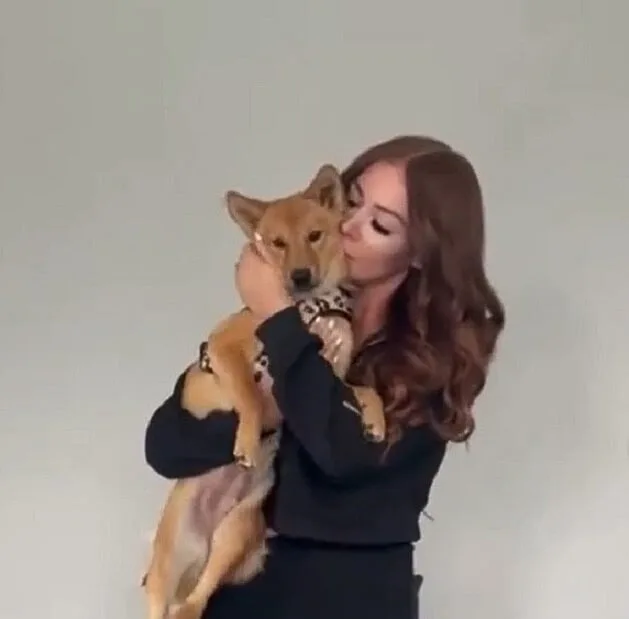
Rosie’s new parents fell in love with her as soon as they saw her. They couldn’t wait to take her home and shower her with love.
Rosie was thrilled to move into her forever home and run into her parents’ arms. She met her doggy brother, Prince, and the two got along wonderfully.
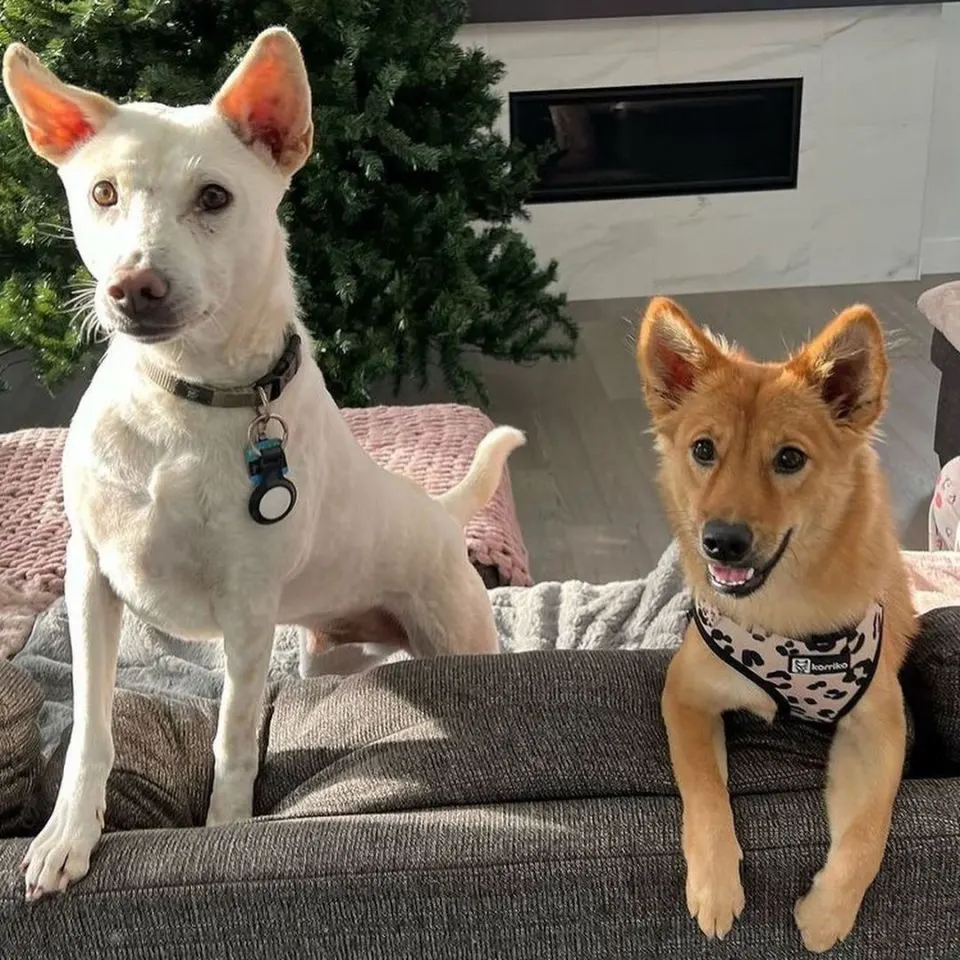
The pooch changed her name to Kenzie. She lives her best life in her home. Her parents dote on her and give her all their love.
“Rescue dogs just have a different kind of appreciation. She just has this look in her eyes, and you can just see that she’s loved. She’s just such a happy little dog. She’s a great addition to the family,“ Chelsea told The Dodo.
We couldn’t be happier for Kenzie. She deserved to find a loving home and great parents who will cherish her and love her forever.
If you’re a dog owner, you know that dealing with your furry friend’s upset stomach can be a messy and concerning issue. One moment, they’re their usual playful selves, and the next, they’re experiencing diarrhea. It can be distressing to see your pup in discomfort, but understanding why this common problem occurs is the first step in helping them feel better.
From scavenging on a walk to sudden diet changes, there are several reasons why dogs may experience diarrhea. As a seasoned dog trainer, I’ve seen my fair share of upset tummies in our four-legged companions. In this article, we’ll explore the various factors that can contribute to your dog’s bout of diarrhea and how you can best support them through it.
Understanding Diarrhea in Dogs
The Digestive System of a Dog
When it comes to understanding why dogs get diarrhea, it’s crucial to consider their digestive system. Dogs have a shorter digestive tract compared to humans, which means food passes through their system more quickly. This rapid digestion can sometimes lead to digestive issues like diarrhea when something disrupts the normal process.
Common Symptoms of Diarrhea
Recognizing the common symptoms of diarrhea in dogs is essential for addressing the issue promptly. Keep an eye out for signs such as frequent loose stools, straining during bowel movements, vomiting, lethargy, and changes in appetite. If you notice these symptoms in your furry companion, it’s time to take action to determine the underlying cause.
Common Causes of Diarrhea in Dogs
Dietary Indiscretion and Food Changes
When your dog has diarrhea, it could be due to eating something they shouldn’t have, like garbage, spoiled food, or even a sudden change in their diet. Dogs are curious creatures and might ingest items that upset their stomachs, leading to diarrhea.
Infections and Parasites
Infections caused by bacteria, viruses, or parasites can also result in diarrhea in dogs. Common culprits include parvovirus, giardia, or worms. These nasties can wreak havoc on your dog’s digestive system, causing loose stools and other unpleasant symptoms.
Stress and Anxiety
Just like humans, dogs can experience stress and anxiety, which might manifest in digestive issues, including diarrhea. Changes in routine, loud noises, or being separated from their favorite person can all contribute to your furry friend feeling anxious and having an upset stomach.
Chronic Illnesses
Certain chronic illnesses such as inflammatory bowel disease, pancreatitis, or colitis can lead to recurrent bouts of diarrhea in dogs. These conditions require proper diagnosis and management by a veterinarian to help your pooch feel better and improve their quality of life.
Diagnosing Diarrhea in Canines
When to See the Vet
If your furry friend is experiencing diarrhea, it’s important to know when to seek professional help. If the diarrhea persists for more than a day, is accompanied by blood, or your dog shows signs of dehydration such as excessive thirst, lethargy, or sunken eyes, it’s time to schedule a visit to the vet.
What to Expect During the Examination
During your vet visit, they will likely ask you questions about your dog’s diet, recent activities, and any changes in behavior. Be prepared to provide details about your dog’s stool consistency, frequency of bowel movements, and any other accompanying symptoms. The vet may conduct a physical exam, recommend a fecal test to check for parasites or infections, or suggest blood work to rule out underlying health issues.
Treatment Options for Dog Diarrhea
At-Home Care and Diet Management
When dealing with your dog’s diarrhea at home, it’s essential to focus on their diet. You can try feeding them bland food like boiled chicken and rice, which is gentle on their stomach and can help firm up their stools. Make sure to provide plenty of fresh water to keep them hydrated, especially if they are experiencing loose stools.
Medications and Probiotics
In some cases, your vet may prescribe medications to help manage your dog’s diarrhea. These medications can include anti-diarrheal drugs or antibiotics, depending on the underlying cause of the issue. Additionally, giving your dog probiotics can help restore the balance of good bacteria in their gut, which may aid in resolving the diarrhea.
Long-Term Management for Chronic Cases
For dogs with chronic diarrhea issues, long-term management is key. This may involve identifying and eliminating trigger foods from your dog’s diet, such as certain proteins or grains that they are intolerant to. Your vet might recommend a specialized diet or supplements to support your dog’s digestive health in the long run. Regular check-ups with your veterinarian are crucial to monitor your dog’s condition and adjust their management plan as needed.
Preventing Diarrhea in Dogs
The Importance of a Balanced Diet
Ensuring your dog has a balanced diet is crucial in preventing diarrhea. Feeding your dog high-quality, easily digestible food can help maintain a healthy digestive system. Avoid sudden changes in your dog’s diet as it can trigger stomach upsets. Stick to a consistent feeding schedule to regulate your dog’s digestion.
Regular Parasite Control
Regular parasite control is essential for preventing diarrhea in dogs. Parasites like worms can cause gastrointestinal issues leading to diarrhea. Consult your veterinarian for an appropriate parasite control program tailored to your dog’s specific needs. By keeping parasites at bay, you can help safeguard your dog’s digestive health.
Stress Reduction Techniques
Stress can contribute to digestive problems in dogs, including diarrhea. Implement stress reduction techniques such as creating a calm environment, providing regular exercise, and ensuring your dog feels secure and loved. Addressing stress triggers early can help prevent digestive upsets and maintain your dog’s overall well-being.
Conclusion
So, there you have it – understanding why dogs get diarrhea is crucial for their well-being. Remember, a balanced diet, regular parasite control, and stress reduction techniques play a key role in preventing those messy situations. By maintaining consistency in feeding, opting for high-quality food, and keeping an eye on parasite control, you can help your furry friend stay happy and healthy. Don’t forget to create a peaceful environment and ensure they get enough exercise. Your pup’s digestive system will thank you for it!
Frequently Asked Questions
What are the common causes of diarrhea in dogs?
Diarrhea in dogs can be caused by various factors such as dietary indiscretion, sudden diet changes, infections, parasites, and underlying health conditions. It is essential to consult a veterinarian to determine the exact cause and appropriate treatment.
How can I prevent diarrhea in my dog?
Preventing diarrhea in dogs involves maintaining a balanced diet, practicing regular parasite control, and reducing stress levels. Consistency in feeding, offering high-quality food, and incorporating stress-reducing techniques like creating a peaceful environment and providing adequate exercise can help prevent digestive issues.
Why is prompt veterinary attention important for dogs with diarrhea?
Prompt veterinary attention is crucial for dogs with diarrhea to identify the underlying cause accurately, prevent dehydration, and initiate the right treatment plan promptly. Delay in seeking veterinary care can lead to complications and worsen the condition.
[no_toc]

Hey there, I’m Janet Brooks, a dog-loving student from California. I’m all about helping pups in need, especially those without homes. Me and my awesome friends work together to give shelter and love to stray dogs. Oh, and I also write blogs about dogs to share helpful info.